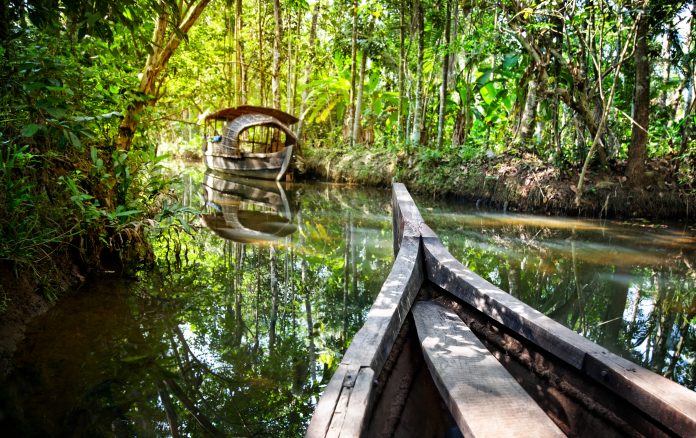The study finds that 20% of existing forests overlap with legal mining and oil extraction areas – a space roughly the size of Egypt
According to data, only 20% of tropical forests can actually be considered “intact”.
However, these areas store roughly 40% of carbon – which means that any deforestation or degradation will release copious amounts of carbon into the atmosphere. This would also harm Indigenous people who call certain rainforests home, but have to constantly navigate the threat of outsiders – whether they are legally sanctioned miners or organised criminals, looking for gold.
In April 2021, a study by the University of Hawaii and NASA found that the Amazon rainforest had stopped functioning as a carbon sink. Now, due to the highest levels of deforestation activity in decades, it is releasing more carbon than it can absorb.
Central Africa has highest risk of forest destruction
In this new study, authors examined which areas of existing forest could be at risk soon. In some regions of the world, legal mining areas overlap with biodiverse tropical rainforest – such as in Brazil, where President Jair Bolsonaro loosened environmental protections over Brazil-governed Amazon areas in 2019. While these parts of the forest are intact right now, they are in an ephemeral, in-between place of existing – will they be mined, used to extract fossil fuels? Or will they not?
The scientists found that Central Africa had the highest level of mining and extraction potential in areas of tropical rainforest, at 26% of existing forest space up for extraction – in other words, that percentage of forest could be destroyed, legally.
Currently, most of the leases to mine are in the “exploratory stage”.
Dr Hedley Grantham, lead author of the study, said: “Many of these extractive projects are still in the early stages. While this could imply a significant future threat to IFLs, it also means there is an opportunity to mitigate potential impacts before they occur.”
What will happen now?
Of course, the team behind this study supports avoidance of extractive projects and encourages Governments to avoid giving contracts to companies which will dismantle “crucial ecosystems”.
As the pandemic continues to unfold, external companies also represent a life or death threat to the Indigenous peoples who live in rainforests. The science supports hesitancy in the name of climate change, but it is also likely that the financial pros run strong in the decision-making of Governments.











